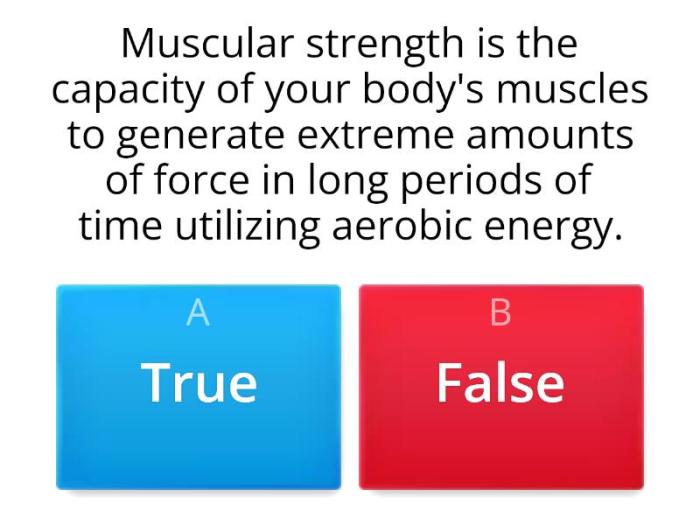Developing muscular strength and endurance quiz – Embark on a journey to master the art of developing muscular strength and endurance. This comprehensive quiz will guide you through the intricacies of building a robust physique, empowering you to achieve your fitness aspirations.
Throughout this engaging exploration, you will delve into the fundamental concepts of muscular strength and endurance, discover effective exercises to enhance each aspect, and uncover the nutritional strategies and recovery techniques essential for maximizing muscle growth and performance.
Defining Muscular Strength and Endurance

Muscular strength and endurance are two distinct yet interrelated aspects of physical fitness. Muscular strength refers to the ability of a muscle or group of muscles to exert force against resistance. It is primarily determined by the size and recruitment of muscle fibers, as well as the efficiency of the neuromuscular system.
Muscular endurance, on the other hand, is the ability of a muscle or group of muscles to perform repeated or sustained contractions over an extended period. It is influenced by factors such as the oxidative capacity of muscle fibers, the availability of energy substrates, and the body’s ability to clear metabolic waste products.
While both muscular strength and endurance are essential for optimal physical performance, they require different training approaches and adaptations.
Developing Muscular Strength, Developing muscular strength and endurance quiz
To develop muscular strength, it is necessary to engage in exercises that challenge the muscles with sufficient resistance. These exercises typically involve lifting weights or using resistance bands. The key principles of strength training include:
- Progressive Overload:Gradually increasing the weight or resistance over time to continuously challenge the muscles and promote growth.
- Specificity:Selecting exercises that target the specific muscle groups or movements desired.
- Compound Exercises:Prioritizing exercises that work multiple muscle groups simultaneously, such as squats, deadlifts, and bench presses.
- Proper Form and Technique:Maintaining correct form and technique to maximize muscle activation and minimize risk of injury.
Developing Muscular Endurance
Enhancing muscular endurance requires exercises that involve repeated or sustained contractions with moderate resistance. These exercises can include running, cycling, swimming, or using endurance-training machines. The key principles of endurance training include:
- Duration and Frequency:Engaging in regular endurance activities for an extended period to improve cardiovascular fitness and muscle stamina.
- Intensity:Maintaining an intensity level that challenges the muscles without causing excessive fatigue.
- Variety:Incorporating different endurance activities to engage various muscle groups and prevent boredom.
- Cardio Integration:Combining endurance training with cardiovascular activities to improve overall fitness and recovery.
Nutrition and Recovery for Muscular Development
Adequate nutrition and rest are crucial for muscle growth and recovery. The following principles should be considered:
- Protein Intake:Consuming sufficient protein, approximately 1.6-2.2 grams per kilogram of body weight daily, to support muscle repair and growth.
- Nutrient-Rich Foods:Incorporating nutrient-dense foods into the diet, such as lean protein, whole grains, fruits, and vegetables.
- Hydration:Staying well-hydrated before, during, and after exercise to support muscle function and recovery.
- Rest and Recovery:Allowing adequate rest between workouts and ensuring sufficient sleep to promote muscle regeneration and prevent overtraining.
Common Queries: Developing Muscular Strength And Endurance Quiz
What is the primary difference between muscular strength and muscular endurance?
Muscular strength refers to the ability to exert force against resistance for a single or a few repetitions, while muscular endurance involves the ability to sustain repeated contractions over an extended period.
How can I effectively develop muscular strength?
Incorporate exercises such as squats, bench press, and deadlifts into your routine, focusing on proper form and gradually increasing weight or resistance.
What is the role of protein in muscular development?
Protein serves as the building blocks for muscle tissue, aiding in muscle growth and repair. Aim to consume 1.2-1.7 grams of protein per kilogram of body weight daily.
Why is rest and recovery important for muscular development?
Rest allows muscles to repair and rebuild, promoting growth and preventing burnout. Aim for 7-9 hours of quality sleep each night and incorporate rest days into your training schedule.


